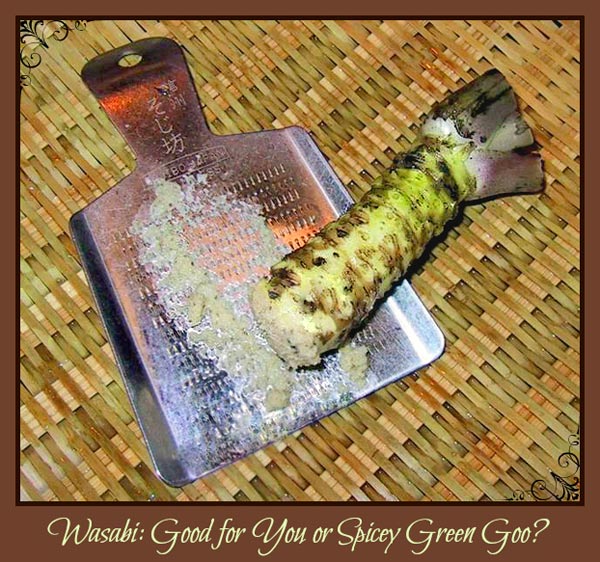
Wasabi sauce – that strange green spicy pile of goo that you always get when you go out for sushi and usually throw away (at least I usually did-since less than a grain of salt’s worth of the stuff makes my head feel like it’s about to come apart at the seams)—well, I had a bad cold which I think turned into an upper respiratory infection and had a real hankering for some sushi one night—and decided maybe some of that repulsive green stuff would be good for relieving congestion.
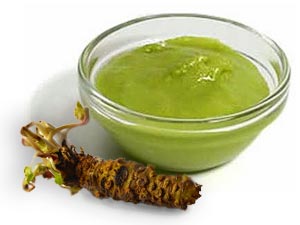
I did feel an immediate sensation of crispness as my nose seemed to clear and I tried not to cry, though when I looked up the reason why it seemed to work as a decongestant, I was surprised to learn wasabi actually makes the nasal passages more narrow-which might explain why later on my nose was even stuffier.
However, far from trying to discredit the health benefits of wasabi, I was surprised to learn it had so many other health benefits besides as an antidote to prevent food poisoning (which is one reason that it is served with sushi and raw fish). Wasabi has anti-bacterial properties and is thought to reduce inflammation, prevent tumors, and even kill cavity causing bacteria! In addition, it may help prevent cancer and heart attacks, and help people suffering from arthritis.
But before you run out to your nearest sushi bar, know that real wasabi (or Japanese horseradish) is very rare in the U.S. and most restaurants serve a mixture of Western horseradish mixed with mustard and green food coloring.
Before you skip the “fake wasabi,” altogether though, it turns out Western horseradish has many of the same health benefits, including antibacterial and anti-inflammatory characteristics, plus it stimulates the immune system, heats up the body, and has aphrodisiacal properties! Though we could probably do without the food coloring.
As I mentioned the true Wasabia japonica rhizome, (the rhizome is the Japanese horseradish root) is hard to find in the US so if you have a good source please share it with us in the comments below. And what do you think, is wasabi good for you?
If you do some searching Amazon does have some natural (aka without the artificial food coloring) wasabi powders and sauces, here is a company that sells a quality 100% wasabi powder without the fillers and dyes.

 Earth Friendly Goodies If it's Good for the Earth it's Good for Your Health
Earth Friendly Goodies If it's Good for the Earth it's Good for Your Health 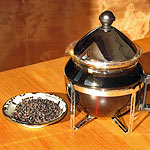
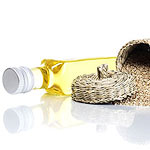
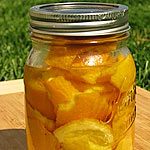
I was afraid you were going to tell me wasabi is bad for me – I love it!!! Glad to know it has healthy properties!
Thanks for stopping by Christy – I learned something new too. That’s the fun of guest authors. 🙂 (Thanks Sandra!)
I haven’t actually tried wasabi yet myself, but It sure sounds like an experience to remember…
I’ve always wanted to try real wasabi. I’ve heard that even in the best Japanese Restaurants and Sushi Bars, you have to ask for it, because it’s so precious. And if they have it, it will be grated directly onto your plate. It requires very cold clear running water to grow well. There is some being grown in China that you can get in Asian Supermarkets in Australia, but it’s supposedly of very inferior quality as it’s be grown in swampy environments, not clear running streams.
Um yah swampy wasabi doesn’t sound so good 🙂 If it requires cold clean water maybe it would grow well around here… although most of our water is frozen over right now – so maybe a bit too cold. 🙂
I heard that real wasabi is actually kind of sweet- unlike the horseradish version. I’m looking forward to trying it when I can find it (and afford it!) 🙂
Wait, where does wasabi came from? I may not know this one because I really don’t eat sushi…
It grows naturally in mountain river valleys in Japan, but it’s very difficult to cultivate and remains quite rare and expensive (still as much as $100/pound!)
I keep a tube of this in my fridge.
Makes a power dip for chips or nuts.
I didn’t know that Japanese Horseradish is different from Western Horseradish. I know someone who likes to grow it in their garden. Fresh horseradish from the garden must be great! I wonder if it’s easy to grow the Japanese version.
Basically i don’t know about wasabi but i have always respect to that kind of herb.we really use Bashak Pata in case of Respiratory tract problem
Good to know! I don’t like sushi so I haven’t heard of wasabi before. I will order some for the next time I catch cold.
I have never really liked wasabi, but now that you have mentioned of its healthy properties, I am more inclined to eat it too. As long as it is healthy, I’d eat it. 🙂
I love Wasabi. Good to hear that it’s actually really great for you to.
I am feeling a bit put out that the Wasabi which I thought was Wasabi was colored horseradish. Does the horseradish contain the same properties that prevent food poisoning? Here I thought when I was eating Sushi I was being all international!
Ah well, good information!
Always loved it, never asked myself why exactly. You just made me feel good about my instincts of choosing spicy things. Great post, btw 🙂
I did look into buying wasabi this year when our powder ran out. What we had was a mixture of horseradish, mustard, and real wasabi but still better than most of what you can buy. I didn’t find anywhere that I could buy real wasabi in a small enough quantity for me, but I did find some places that you could buy a larger quantity, like Frog Eyes Wasabi in Oregon. Would love to visit that farm some day. For now, I gave in and got a small, expensive tin which is, again, a mix of horseradish, mustard, and wasabi. At least it doesn’t have green food coloring.